Is It Safe to Fly? Insiders Say Egypt Crash Could Happen Here

Grieving relatives of a passenger aboard a Russian airliner that crashed in Egypt gather in St. Petersburg, Russia. Should we be worried about air travel? (AP Photo/Dmitry Lovetsky)
It’s the kind of story that can send a chill through air travelers all over the world. A Metrojet Airbus A321-200 with 224 people on board (most of them Russian tourists) mysteriously crashed Oct. 31 in Egypt’s Sinai Peninsula. And as authorities investigate what brought down the plane, which took off from the Sinai resort town of Sharm el-Sheikh bound for St. Petersburg, it’s hard to tell what’s scarier: that we don’t know for sure what brought down the plane, or that we probably do.
Related: 20,000 Tourists Stranded in Egypt Amid Terrorism Concerns
While an official determination has yet to be made, all signs are pointing to this being a terrorist attack. Over the weekend, officials in Egypt revealed that, in the final second of the plane’s cockpit voice recording, a loud noise can be heard — a noise that might have been a bomb. According to a CNN report, investigators in Europe who’ve analyzed both the plane’s cockpit voice recorder and its flight data recorder say they’ve found signs of an explosion that was not accidental. That would jibe with U.S. and European intelligence reports, plus an unproven claim of responsibility from the ISIS Sinai affiliate, that the Metrojet plane was brought down by some sort of explosive.
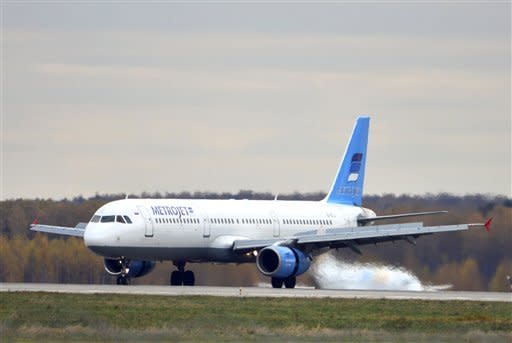
The Metrojet plane that crashed in Egypt is pictured here in Moscow 11 days before the tragedy. (Photo: AP)
Naturally, the Metrojet crash has led to concerns about terrorism and air safety. Once again, air travelers worldwide are asking: Is it safe to fly? Well, yes… and sometimes no.
Here are five reasons to worry about flying in the wake of the Metrojet crash — and five reasons not to.
Reason to Worry: This could have been an inside job
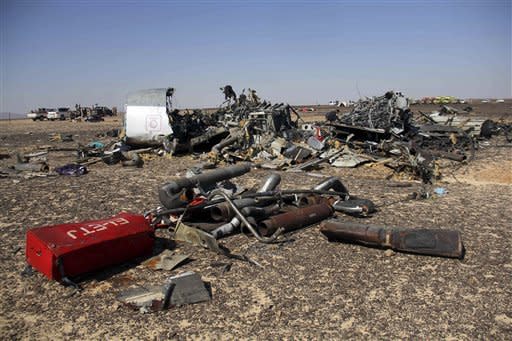
If this was a bomb, did an airport worker bring it on board? (Photo: AP)
According to a BBC report cited by CNN, U.K. intelligence officials not only suspect a bomb brought down the Metrojet plane, they think it may have been smuggled on board by an airport worker at Sharm el-Sheikh. If that turns out to be true, that would confirm fears security experts have long expressed: that airport workers can use their access to airplanes to carry out terrorist attacks.
Related: No Fly Zone? Most Dangerous Places for Air Travel
“The [security] focus is always on the passengers bringing stuff on the plane, things in their baggage,” Kyle Bailey — an FAA safety representative, pilot and aviation analyst — tells Yahoo Travel. “But there are so many other ways that a bomb can be brought onto an airplane.” He says everyone from baggage handlers, mechanics, food workers, and even those who service airplane lavatories present a potential danger.
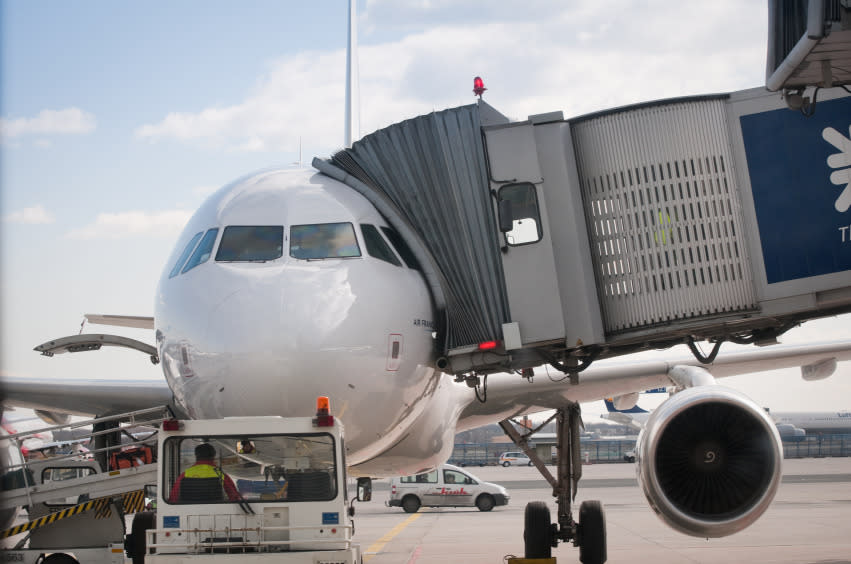
Lots of people have access to a plane before it takes off. Could that be a recipe for terrorist sabotage? (Photo: Getty Images)
Some potential close calls illustrate that danger. In 2008, a man who once worked at a duty-free shop at Los Angeles International Airport was convicted of joining a domestic terrorist cell that was planning to attack U.S. targets. And last year, a Somali-American who used to clean planes at Minneapolis-St. Paul International Airport reportedly was killed fighting for ISIS in Syria.
While there’s no proof that either man plotted terrorist attacks during his employment as an airport worker, security experts say those cases — as well as the possibility of an inside job in the Egypt crash — are cause for concern. “We’ve seen instances where people who have been employed [at airports] are perfect examples of what could be a homegrown terror threat, if they wanted to be, in terms of access and capability to get an explosive onto an airplane,” transportation and counterterrorism expert Erroll Southers said during an interview with Yahoo News’ Bianna Golodryga.
Reason Not to Worry: U.S. security officials are boosting security
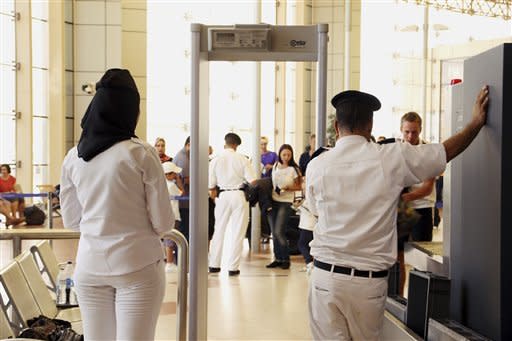
Security guards at Egypt’s Sharm el-Sheikh International Airport stand by as British tourists stranded after airlines canceled flights there wait. (AP Photo)
In the days after the Egypt crash, U.S. officials announced enhanced security measures for U.S.-bound commercial flights from certain airports in the Middle East. U.S. officials aren’t saying what those airports are, but NBC News reports they involve at least 10 airports, including those in Cairo, Kuwait, and Jordan.
Reason to Worry: Terrorists want to attack airplanes
And 14 years after the 9/11 attacks, commercial airplanes remain attractive targets for terrorists. “They’re not just looking for casualties and dead bodies,” Bailey says of airplane-targeting terrorists, “they’re looking to cause substantial financial losses."
According to the Fiscal Times, the U.S. travel industry estimates in the 10 years after the 9/11 attacks, the U.S. lost $600 billion as international visitors stayed away from the U.S. More recently, Tunisia estimates it will lose more than $500 million from a June terrorist attack in the resort town of Sousse, where a gunman killed roughly 40 mostly foreign tourists (that attack was just a couple of months after 22 people, mostly tourists on a cruise ship excursion, were gunned down at a museum in Tunis).

Tourists at Sharm el-Sheikh swim in the Red Sea at a hotel this weekend. Many Russian and British tourist remain stranded after the October 31 crash. (Photo: AP)
In Egypt, whose tourism industry has already lost billions of dollars in recent years due to regional instability, the Metrojet crash could make things even worse. "People don’t realize the economic impact this will have on that particular tourist destination,” says Bailey. “It will be devastating for that economy.”
In fact, Mohamed Yousef, the adviser to Egypt’s minister of tourism, said that the tourism industry could lose 70 percent of its total visitors, due to the recent incident.
Reason Not to Worry: Terrorist attacks on planes are still rare
Terrorism makes for horrific headlines, but the fact remains that virtually every day, each of the roughly 100,000 flights that take off worldwide lands safely. While being in a plane crash is extremely unlikely, being in a plane crash caused by terrorism is infinitesimally so.
PlaneCrashInfo.com looked at all fatal plane incidents since the 1950s and found that intentional sabotage was a factor in only 8 percent of them. “You have a better chance of hitting the lottery or being struck by lightning than to get caught up in terrorist activity,” says Bailey.
And it is certain that this incident will spur security enhancements. At the Dubai Airshow on Sunday, Emirates Airlines President Tim Clark called the crash a “game changer” and predicted that it “will make some fairly stringent, draconian demands on the way aviation works with security.“
Reason to Worry: The Middle East might be a dangerous place to travel
It may go without saying, but traveling in the Middle East/North Africa region can be risky for Americans. Roughly half the countries in the region are under an official U.S. travel warning — the strongest State Department warning, which generally urges Americans to avoid travel to a certain country. Even countries like Egypt, which is not under a travel warning, present a danger to Americans; U.S. officials say Egypt’s Sinai Peninsula, where the Metrojet crash occurred, has recently become an epicenter for "jihadist elements” linked to attacks against foreigners — including a bus bombing that killed four tourists in a Sinai resort in February of 2014 and the carjacking murder of an American citizen in August of 2014.
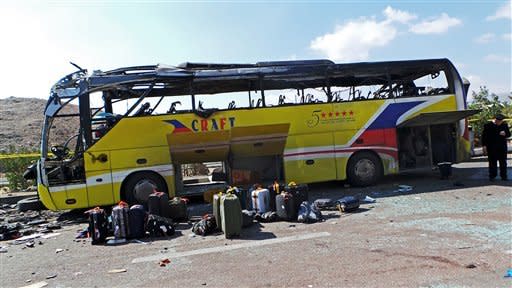
This bus filled with South Korean tourists was bombed near the Israeli border in February of 2014. Four people were killed. (Photo: AP Photo)
Even apart from terrorist activity, this isn’t the safest place to fly. According to the International Air Transport Association, the Middle East/North Africa region’s five-year accident rate (2009-2013) was 5.43 per one million flights. Consider that North America’s rate was 1.38.
Reason Not to Worry: Airports and airlines serving the U.S. are tightly regulated
Airports and airlines that fly directly to the U.S. must adhere to Transportation Security Administration security measures. “The travel regulations for anyone who would fly here from those countries is pretty much the same,” Southers tells Yahoo News. “The standards across the board, as they are dictated by the regulation authorities, are fairly consistent."
WATCH: Deadly Egyptian plane crash prompts increased security at airports
No such measures are required in Sharm el-Sheikh because there are no direct U.S. flights to or from that airport. But that has less to do with security concerns and more to do with supply and demand. "It’’s not really a big tourist destination for the United States,” Bailey says of Sharm el-Sheikh. “So there probably isn’t enough demand to fill up those airplanes to fly there nonstop.”
Reason to Worry: If someone is determined to attack an airplane, they will
It’s a sobering fact that any security expert would have to admit. “There is no ‘zero-risk proposition’ when it comes to security,” Southers warns. “If someone wants to get an explosive device on an aircraft it can be done.”
Reason Not to Worry: It’s out of your control, so just live your life
There are some measures you can take for your safety while traveling, especially to this region. Check sites like the State Department’s Alerts and Warnings page for detailed threat assessments and safety tips for any country you plan to visit.
Bailey also suggests flying only major airlines, which tend to have stricter security standards. “You know there will never be corners cut on security,” he says. “Stay on the major airlines even if you’re doing multiple connections — even if it means driving a little bit.”
Related: How to Travel Abroad Safely in the Age of Terrorism
Apart from all that, however, worrying doesn’t really help matters.The scary thing about terrorism is that it’s mostly out of your control. For that reason, Bailey says, being overly concerned about it is a waste of time. “You shouldn’t be fearful [of travel] because that’s what the terrorists want,” Bailey says. Still, in the wake of that mysterious Egypt crash, it may not be unreasonable for travelers to think twice about where they go.
WATCH: 5 Airport Hacks You’ve Never Heard Of (That Work)

